Late last month, the NLRB (National Labor Relations Board) released its final rule defining its new standard for joint-employer status. This ruling reverses the franchise-friendlier rule that was adopted in 2020 and replaces it with a franchise-adverse rule that will likely negatively impact the franchise industry model, as well as other industries, including staffing agencies.
The NLRB has provided “an exhaustive list of seven categories of terms or conditions of employment that will be considered essential for the purposes of the joint-employer inquiry.
These are:
(1) wages, benefits, and other compensation;
(2) hours of work and scheduling;
(3) the assignment of duties to be performed;
(4) the supervision of the performance of duties;
(5) work rules and directions governing the manner, means, and methods of the performance of duties and the grounds for discipline;
(6) the tenure of employment, including hiring and discharge; and
(7) working conditions related to the safety and health of employees.”
Just one (or more) of the above seven terms or conditions would be sufficient to establish a joint employer relationship. As a franchise brand typically outlines the processes and procedures for a successful franchisee, this new rule will likely drag franchisors into being considered a joint employer. The NLRB has indicated that their new joint-employer rule will become effective as of December 26, 2023. Given the extreme shift in joint-employer definition, it is expected that legal challenges will arise, which may possibly delay the implementation date. However, for those that rely on the franchise model to thrive, now may be a good time to contact your Congressional Representatives and Senators and encourage them to act to not allow this over-reaching definition to be implemented.
Posted by: Rudy Troisi, L.P.I., President and CEO, Reliable Background Screening
Copyright © 2023, Reliable Background Screening, a Division of Marcett, Inc. All rights reserved.


